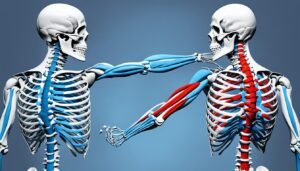Burning back pain is common and can really disrupt your life. It affects about 80% of people in the U.S. at some point. This kind of pain usually comes from nerve damage or muscle tension. It can also be from infections, arthritis, or problems with your bladder or kidneys.
Sharp, burning pain in your back makes everything harder. Working, moving, and even sleeping can be painful. If you feel this, it’s important not to ignore it. It might be a hint that something serious needs looking at. We will talk about why this pain happens, how to treat it, and ways to stop it from coming back.
Key Takeaways
- Burning back pain can be caused by nerve damage, muscle issues, spinal problems, injuries, or other underlying conditions.
- Seeking prompt medical attention and following a personalized treatment plan are crucial for managing burning back pain.
- Preventive measures, such as regular exercise, proper lifting techniques, and maintaining a healthy weight, can help reduce the risk of developing burning back pain.
- Chronic burning back pain lasting three months or more may require prescription medications, physical therapy, or even surgery in some cases.
- Back pain should not be ignored, as it could be a sign of a more serious underlying condition.
What is Burning Back Pain?
Burning back pain feels like heat or tingling in your back. Sharp pain can shoot into your legs like lightning. You might also feel numb, tingly, or swollen. It can get worse when you lie down or move.
Types of Back Pain
Some feel burning pain in their upper, middle, or lower back. For others, this pain shoots to the neck, buttocks, hips, or legs. It can hurt on one side, both sides, or travel around.
Symptoms of Burning Back Pain
Burning back pain seems like a hot, tingling feeling in the back. It can come with sharp pain down the legs. You might feel numb or tingly. It might get worse when lying down or moving.
Causes of Lower Back Pain Burning
Burning back pain often comes from nerve issues. These nerves run down the back and into the legs. They might not work right because of a disease like diabetes. Or, a back problem could be the cause.
Problems with the spine’s discs can cause sciatica. This is a sharp nerve pain from the back to the feet. Issues like degenerative discs, herniated discs, and spinal stenosis squeeze on nerves, hurting a lot. Even the covering of the spinal cord can get inflamed, causing pain. Diseases like shingles, multiple sclerosis, or Lyme can also hurt the nerves.
Spinal Problems
The discs are like cushions between the spine bones. If these discs near the hips get damaged, they can irritate the sciatic nerve. This causes sharp pain down the leg. For instance, degenerative disc disease can create bone spurs that pinch nerves. And a herniated disc can cause the same issue. Spinal stenosis is when this irritation narrows and squeezes the spinal cord. This can make legs feel weak or numb.
Muscle Issues
Strains in the muscles can start because of an injury or too much tension. The back muscles might get weak after many injuries, leading to more spasms. Bad posture or being very overweight can also put a strain on the muscles. This makes them prone to pain or spasms.
Injuries and Tumors
Sharp back pain can happen if the soft tissues around the spine get hurt. The pain sometimes spreads over time from the original injury. Tumors, whether they’re cancerous or not, can also push on the spine. This can cause a burning-like back pain.
Other Causes
There are many other reasons why your back could feel like it’s burning. Infections, kidney stones, or problems like arthritis or endometriosis are some. Even a spinal tumor might cause this kind of pain, though it’s rare.
Diagnosing Burning Back Pain
Your doctor will want to know your full medical history. They will also do a physical exam. You’ll answer questions about your pain. They will ask if you hurt your back recently. They want to know if the pain is worse with certain activities and if you have any other symptoms.
Medical History and Physical Exam
Your doctor will ask about past back injuries or conditions. They’ll also ask about what you’re feeling now. They will check your back for tenderness, muscle spasms, and how much you can move.
Diagnostic Tests
If needed, your doctor may order different tests. These tests help find out why your back hurts. Blood tests, bone scans, and other tests like CT scans help look for nerve damage or infections.
Treating Acute Burning Back Pain
Acute burning back pain can usually go away in a few days or weeks. You just need to take it easy and let your body heal.
Self-Care Measures
There are steps you can take to handle acute burning back pain on your own. Let’s check them out:
- Rest: Taking a break from your daily activities and getting lots of rest is crucial. Avoid actions that make the pain worse.
- Apply Ice: Putting an ice pack on your back for 15-20 minutes can ease the pain and lower swelling. Do this several times a day.
- Take Over-the-Counter Medications: Medicines like ibuprofen or naproxen can help with pain and swelling.
- Gradually Return to Activity: After resting a few days, slowly start doing light movements and exercises. This helps stop you from getting stiff and speeds up healing.
Most times, acute burning back pain will be better in a week or two with the right care at home. But, if the pain doesn’t go away or gets worse, see a doctor. They can find out what’s causing it and help.
Treating Chronic Lower Back Pain Burning
If your back pain burns for three months or more, get help. You might need nerve damage medicines like gabapentin. Prescription drugs for nerve pain can help a lot.
Medications
Medicine is key for ongoing burning back pain. Drugs like gabapentin cut nerve pain signals. Your doctor might also suggest antidepressants or pain creams.
Physical Therapy
Physical therapy is great for such pain. A specialist will make a plan to make your back stronger. They’ll use exercise, massage, and more to ease the hurt.
Surgery
Sometimes, surgery is needed for serious conditions like a herniated disc or spinal stenosis. It can stop the pain by fixing the problem. Yet, surgery is usually the last choice.
Talk to your doctor for a plan to treat the cause of your back pain. Together, you can make things better and live well again.
Living with Lower Back Pain Burning
Chronic burning back pain needs a varied approach to manage. Include specific exercises, lift right, and use ergonomic habits. These steps can ease pain and stop it from getting worse.
Exercise and Stretching
Exercise is key to dealing with and preventing back pain. It boosts your posture and flexibility. Activities like yoga and swimming strengthen your core and improve your back health.
Proper Lifting Techniques
Using the right lifting methods is vital to avoid back injuries and pain. Always bend your knees and keep the object close. Don’t twist your back. Good posture and strong core muscles protect your spine every day.
Ergonomic Tips
Good posture, breaks from sitting too long, and using the right furniture can ease back pain. Get a good office chair or use a lumbar support cushion to keep your spine in line. Stretch and move during breaks to stay flexible and reduce back strain.
When to See a Doctor
Hurting in your back for more than three days? Or is the pain really strong? Seeing a doctor is the smart move. Here’s why:
- Persistent, intense back pain that doesn’t improve with rest or over-the-counter medication
- Back pain that radiates down one or both legs, which could be a sign of sciatica
- Weakness, numbness, or tingling in the legs, which may indicate nerve irritation
- Unintentional weight loss or a fever that doesn’t respond to medication
- Loss of bowel or bladder control, which could be a sign of a serious condition called cauda equina syndrome
- Back pain that developed after a traumatic injury, such as a car accident or fall
Feeling unsure? Don’t wait. If your back pain keeps up, or if any of these signs show up, see a doctor. Getting help fast is key. It can fix what’s wrong and stop problems from getting worse.
Preventing Lower Back Pain Burning
To stop burning back pain, take steps to keep your back healthy. Do exercises regularly to make your back muscles strong and flexible. This lowers your chance of getting hurt or strained. Don’t do things that stress your back too much, like heavy lifting or sudden twists, to help avoid pain.
Having good posture is key. Sit and stand up straight. Slouching piles up harm on your muscles and makes your back work too hard. It’s also smart to keep a healthy weight and not smoke. These things can help your spine a lot and make burning back pain less likely.
When you need to bend or lift, do it right. Get close to what you’re lifting, bend your knees, and lift with your legs, not your back. Don’t twist your body, or you might hurt yourself. Also, be sure to take breaks from sitting or standing for too long. This gives your back a rest and stops pain before it starts.
| Preventive Measure | Benefit |
|---|---|
| Regular exercise | Strengthens back muscles and improves flexibility |
| Maintaining good posture | Reduces strain and improves spinal alignment |
| Healthy weight management | Lessens the burden on the spine |
| Proper lifting techniques | Avoids sudden stress and strain on the back |
| Regular breaks from sitting/standing | Alleviates pressure on the back |
Following these steps can greatly cut down on your risk of burning back pain. Keep your back strong, and you’ll enjoy a healthy life with less back trouble.
Conclusion
Burning back pain is a common issue. It can be very hard to deal with. This pain can be from many things, like nerve damage or muscle problems. It might come from an injury, or in rare cases, a tumor.
Getting help fast and having a plan for fixing the pain is so important. This can stop the pain from getting worse. To feel better and live well, know what’s causing the pain. Then, get the right care and do things to stop it from happening again.
Don’t ignore your back pain, whether it lasts a short or long time. Talk to a doctor or a health expert. They can find out why you hurt and make a plan to help you.
With the right care and some changes, you can feel better. You can also stop the pain from coming back.
Even though burning back pain is tough, there are ways to manage it. Work closely with your doctor. Also, change some things in your life to keep your back healthy. This way, you can get ahead of your back pain and feel better overall.




